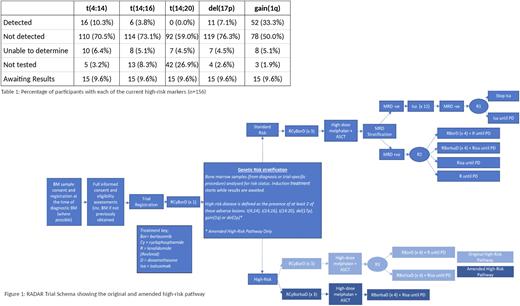Abstract
Background. Outcomes in newly diagnosed multiple myeloma (MM) are influenced by genetic risk by FISH or molecular profiling determined prior to therapy (Shah. V et al, 2022, DOI: 10.1038/leu.2017.179), and depth of response after therapy as determined by IMWG and minimal residual disease (MRD, De Tute, RM et al, 2022, DOI: 10.1200/JCO.21.02228). Results of OPTIMUM/MUKnine (NCT03188172) provide compelling evidence for intensification of therapy in patients with genetically determined high-risk disease, but strategies to incorporate MRD as a predictive tool to reactively adapt therapy according to response are yet to be proven.
Study Design / Methods. The UK-MRA RADAR study is a national, multi-centre, risk-adapted, response-guided multi-arm, multi-stage (MAMS) phase II/III trial which will recruit 1400 patients with newly diagnosed MM eligible for ASCT. Eligible patients receive induction with 4 cycles of RCyBorD (lenalidomide, cyclophosphamide, bortezomib, dexamethasone), followed by high-dose melphalan and stem cell rescue. In the current protocol, post-ASCT treatment is determined by genetic risk classification and MRD status (Figure 1).
Genetic risk classification in RADAR is performed using standard-of-care NHS FISH testing at local sites. Laboratory reports are reviewed by the Trial Management Group and participants enter the standard or high-risk pathway based on the presence of at least two of the markers: t(4;14), t(14;16), t(14:20), del(17p) and gain(1q). Participants who cannot be categorised after two attempts are classed as "Unable to Determine" and treated on the standard-risk pathway. MRD analysis in RADAR uses a multi-parametric flow panel with CD319 and CD229 used to augment post-Isatuximab sample analysis at a central laboratory, with negativity defined at threshold of 10-5.
For standard-risk patients, the study addresses two pivotal MRD-related questions:
1) For those with sustained MRD negativity after 12 months of isatuximab maintenance, can treatment be stopped safely to allow patients a treatment-free interval thereby reducing treatment burden?
2) For patients with persistent detectable disease after ASCT, does intensification of consolidation and maintenance therapy augment conversion to MRD negativity compared to lenalidomide maintenance?
For high-risk participants the original study question was: do intensified consolidation and maintenance regimens post-ASCT show activity in prolonging disease control? With new data from OPTIMUM, however, RADAR was amended so that high risk participants receive isatuximab with cycles 2-4 of induction, 4 cycles of RBorIsaD consolidation and R-Isa maintenance until progression (Figure 1). At the same time del(1p) was added as a high-risk marker. The amended question for the high-risk pathway is: does induction, consolidation and maintenance incorporating isatuximab, show activity of prolonging disease control?
Trial Progress. RADAR opened to recruitment in May 2021 and is currently recruiting at 37 NHS sites with a further 40 sites in setup. 156 patients have been recruited; 20 are classified as high risk on FISH analysis (116 standard risk, 5 unable to determine, 15 TBC). Proportions of patients with each high-risk lesion are shown in Table 1. 27 patients have completed ASCT, and 10 have reached D+100 MRD assessment. Of the standard risk patients reaching the D+100 timepoint, 4 are MRD positive and 4 MRD negative and have been randomised to consolidation and maintenance options accordingly. Assessments of COVID-19 vaccination, immunity and infection are being recorded within the RADAR trial and the effect of isatuximab will be examined.
Discussion. The RADAR study simultaneously tests escalation and de-escalation strategies, according to disease response, and using MRD to guide therapy in transplant-eligible MM. Use of local results for genetic risk stratification has proven feasible in 96.5% of patients to date. Recruitment is on target and outcomes will provide RCT-level evidence for the adaptive use of MRD in treatment allocation. Finally, the platform design enabled adaptation, in this case, to include CD38 antibody for high-risk patients, ensuring up-to-date treatment based on latest evidence, keeping pace with evolving standard of care in the UK, and without altering the scientific MRD-related questions.
Disclosures
Ramasamy:Takeda, Bristol Myers Squibb, Janssen, Amgen, GlaxoSmithKline: Honoraria, Membership on an entity's Board of Directors or advisory committees, Other: Travel, Research Funding, Speakers Bureau; Sanofi, Adaptive biotech, Oncopeptides: Honoraria, Membership on an entity's Board of Directors or advisory committees, Speakers Bureau. Parrish:BMS/Celgene: Consultancy, Speakers Bureau; Sanofi: Consultancy, Speakers Bureau; Abbvie: Consultancy, Speakers Bureau; Everything Genetic: Consultancy; Janssen: Speakers Bureau; Jazz: Speakers Bureau; Takeda: Honoraria, Speakers Bureau; Novartis: Honoraria; Gilead: Honoraria. Drayson:Abingdon Health: Current equity holder in private company. Jenner:Janssen: Consultancy, Honoraria; BMS/Celgene: Consultancy, Honoraria; Takeda: Consultancy; Pfizer: Consultancy; GSK: Consultancy. Kaiser:AbbVie: Consultancy; BMS/Celgene: Honoraria, Research Funding; Pfizer: Consultancy; Karyopharm: Consultancy; Janssen: Honoraria, Research Funding; GSK: Consultancy; Seattle Genetics: Consultancy; Takeda: Honoraria. Pratt:BMS/Celgene: Consultancy; Binding Site: Consultancy; Gilead: Consultancy; Janssen: Consultancy; Takeda: Consultancy; Amgen: Consultancy. Cook:Karyopharm: Consultancy; Sanofi: Consultancy; Takeda: Consultancy, Research Funding; BMS/Celgene: Consultancy, Research Funding; Janssen: Consultancy, Research Funding; Amgen: Consultancy. Popat:Janssen, Takeda, Celgene, and GSK: Honoraria; Takeda: Research Funding; Takeda, AbbVie, GlaxoSmithKline, and Celgene: Consultancy; BMS: Honoraria; GSK: Honoraria, Research Funding; Roche: Honoraria; Janssen: Honoraria; Janssen, Takeda, GSK: Other: Travel expenses from Janssen, Takeda, GSK. Chapman:Sanofi: Honoraria. Jackson:BMS: Consultancy, Honoraria, Speakers Bureau; Takeda: Consultancy, Honoraria, Research Funding, Speakers Bureau; amgen: Consultancy, Honoraria, Research Funding, Speakers Bureau; J and |J: Consultancy, Honoraria, Speakers Bureau; Pfizer: Consultancy, Honoraria; GSK: Consultancy, Honoraria, Speakers Bureau; Sanofi: Consultancy, Honoraria, Speakers Bureau; Oncopeptides: Consultancy. Owen:Beigene: Honoraria, Membership on an entity's Board of Directors or advisory committees; Janssen: Honoraria, Membership on an entity's Board of Directors or advisory committees; Astra-Zeneca: Honoraria. Cairns:Takeda: Research Funding; Amgen: Research Funding; Celgene/BMS: Honoraria.
Author notes
Asterisk with author names denotes non-ASH members.


This feature is available to Subscribers Only
Sign In or Create an Account Close Modal